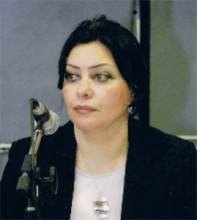You are here
Failure and moral collapse of the international legal order in Gaza
May 05,2025 - Last updated at May 05,2025
The world has been witnessing for over eighteen months a brutal escalation of violence in Gaza and the broader Palestinian territories since Israel launched a military campaign in the Strip in response to Hamas’s cross-border attack on October 7, 2023. For many experts and humanitarian observers, what the war-ravaged tiny Palestinian territory has been seeing is a genocide, ethnic cleansing, and collective punishment.
Israel’s relentless air, land, and sea bombardment, accompanied by a complete siege of the Gaza Strip, has transformed the enclave into a wasteland of rubble and death. Survivors—men, women, children, and the elderly—struggle daily amid deprivation, disease, and devastation. No one has been spared: journalists, medical workers, babies, pregnant women, the disabled, civil servants, and humanitarian workers have all been targeted.
Entire families have been exterminated. Generations have been erased. Those who survive remain displaced, trapped in shrinking zones corralled into overcrowded camps and shelters—constantly bombed, with no safe refuge in sight.
Israeli forces have not only rained down destruction from the skies but have also cut off vital access to food, water, electricity, fuel, and humanitarian aid. The result has been a rapid slide into starvation. On April 27, the World Food Programme warned that thousands of Palestinians face death by starvation due to the Israeli-imposed blockade.
The UN humanitarian agency OCHA recently described the crisis in Gaza as "probably the worst" since the conflict began. The destruction of medical facilities and the deliberate obstruction of medical supplies have rendered preventable illnesses fatal, sparking widespread outbreaks and compounding the suffering.
In parallel, Israel’s attacks on schools, universities, cultural institutions, and heritage sites threaten to obliterate Palestinian identity and national existence. Meanwhile, a surge in settler violence, land grabs, and killings in the occupied West Bank, including East Jerusalem, underscores a broader campaign of displacement and domination.
Despite the clear evidence of mass atrocities, Israel continues to act with impunity. More than 51,500 Palestinians have been killed and over 117,000 injured since October 2023. The international community, though broadly aware of the scale of suffering, has largely responded with silence—or worse, with continued arms shipments and diplomatic cover for Israel.
This inaction reflects not just a moral failure but the collapse of the very international legal order meant to prevent such crimes. The Geneva Conventions, the Rome Statute, and countless UN resolutions—designed to uphold the rights and dignity of civilians during wartime—have been flagrantly violated, yet no meaningful consequences have followed.
Instead of intervening to halt the suffering, Israeli lawmakers have taken steps to further entrench the crisis. On October 28, 2024, the Israeli government passed a bill to ban the United Nations Relief and Works Agency (UNRWA)—the largest provider of aid in Gaza—from operating. At the same time, the health ministry has warned that Israel’s blockade of vaccines, including for polio, leaves over 600,000 children at risk of paralysis and chronic illness.
On the legal front, mechanisms for justice appear increasingly toothless. While the International Court of Justice (ICJ) extended Israel’s deadline to respond to genocide charges until January 2026, the move raises serious questions about accountability and delay. Arrest warrants issued by the International Criminal Court (ICC) against Israeli prime minister Benjamin Netanyahu and former defense minister Yoav Gallant remain unenforced.
The ICC, ICJ, and several UN bodies—founded to protect civilians and prevent mass atrocities—are now perceived by many as complicit through inaction. Their failure to respond decisively to the mass killings, displacement, and destruction in Gaza has laid bare deep structural flaws in the global security and justice architecture.
This silence is not neutral. It emboldens further violence, legitimizes impunity, and deepens the suffering of Palestinians. With the support of powerful allies, Israel continues its assault with what appears to be unshakable confidence in the absence of consequences.
A permanent ceasefire must be urgently enacted and monitored by an independent international body. Israel must immediately lift the blockade on Gaza and ensure unfettered access for humanitarian aid. The ICJ’s provisional measures must be implemented without delay, and states party to the Genocide Convention must support, rather than undermine, the judicial process.
Furthermore, the ICC must be empowered to carry out its mandate independently and without obstruction. All parties involved must work toward a sustainable political solution grounded in international law and longstanding UN resolutions.
The world must realign its moral compass. Justice and peace cannot be selective. True peace will remain out of reach until Palestinians are afforded the right to live in dignity, safety, and freedom.
Najla M. Shahwan is a Palestinian author, researcher and freelance journalist. Author of thirteen books in literature and a children story collection, Shahwan is the Chairwoman of the Palestinian Center for Children’s Literature and founder of Jana Woman Cultural Magazine.














Add new comment